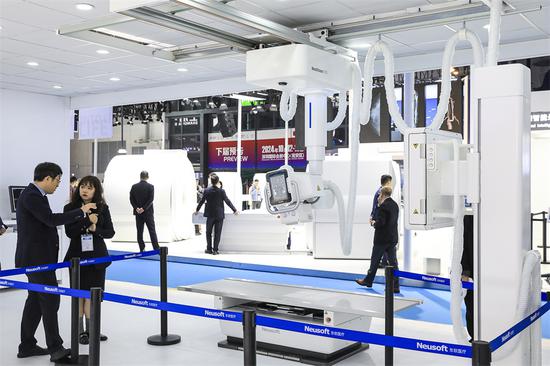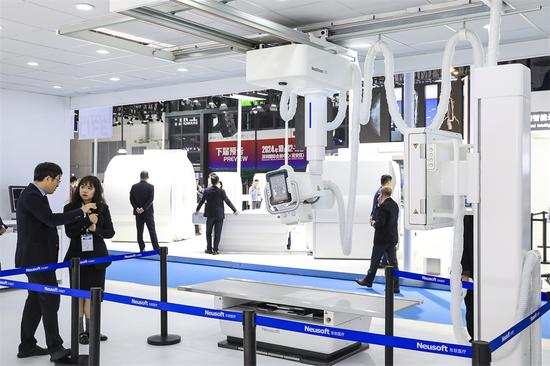Cutting-edge tech boosting diagnostic accuracy

Visitors check out digitalized X-ray equipment during a medical supply expo in Shanghai in April. (CHINA DAILY)
Artificial intelligence is expected to boost today's medical sector by enhancing diagnostic accuracy and facilitating clinical decision-making, if combined well with irreplaceable human expertise that underpins effective healthcare, experts said.
In a study published this month in international science journal The Lancet Digital Health, Japanese scientists said they have developed an AI model that can determine lung functionality from chest radiographs with high accuracy.
The method, using static information from chest X-rays, demonstrates the potential to accurately estimate lung functionality — an assessment typically requiring physically demanding tests for patients, said Daiju Ueda, one of the scientists in the study, in an earlier report by Science Daily.
The results showed a pearson's correlation coefficient of more than 0.90, indicating that the method is sufficiently promising for practical use.
"AI holds especially significant potential in medical technology departments such as imaging, pathology and ultrasound," said Yuan Jinglin, vice-president of Beijing Daxing District People's Hospital, during the China Digital Health Conference 2024 held in Beijing this month.
Yuan said that in radiology in the neurology field, for instance, AI can rapidly identify the extent of cerebral infarction and salvageable tissue in acute stroke patients, a task that would be challenging for physicians to perform without AI's objective data and precise evidence.
"AI-assisted decision-making can substantially reduce medical errors and provide more informed choices during patient care," said Lu Zhaohui, deputy director of the international exchange office at the Shanghai Jiao Tong University School of Medicine.
AI's application is particularly valuable in the deep mining of clinical data and aiding the formulation of clinical plans, such as providing surgical and chemotherapy solutions, Lu said, adding that AI can also help enhance hospital operational efficiency by facilitating data-driven management and enabling real-time comprehensive monitoring of medical processes.
Lu also highlighted the transformative impact of AI on infection control. "Incorporating AI for real-time surveillance and predictive monitoring, rather than retrospective checks, significantly boosts the precision of hospital operations," he said.
According to data from market consultancy International Data Corp, the global AI application market is projected to reach $127 billion by 2025, with the medical sector accounting for one-fifth of the total market value.
However, AI's limitations in clinical applications can not be overlooked. Accurate diagnosis still relies heavily on the clinical expertise of physicians rather than solely on AI data, especially in certain areas such as chronic occlusive vascular issues, Yuan said. "AI should serve as an auxiliary tool rather than a decisionmaker."
Hou Xiaobing, president of Beijing First Hospital of Integrated Chinese and Western Medicine, noted that traditional Chinese medicine has a lot to do with face-to-face consulting, and the four specific forms of intake to determine diagnosis — looking, listening, asking and feeling the pulse — cannot be accomplished by current AI technologies.
"TCM encompasses a wide array of schools and perspectives. For the same illness, different schools and experts may propose varying treatment plans. This diversity necessitates addressing the issue of standardization when developing AI for TCM," Hou said.
Additionally, TCM's external treatments, such as acupuncture and massage, depend on the practitioner's hands-on skills, and thus cannot be easily replaced by automated AI equipment either, he said.
Hou added that establishing standardized treatment protocols and processes, through guidelines or consensus, is crucial for training AI models. Only with improved accuracy can AI assist more grassroots-level doctors in providing the precise expertise of seasoned TCM practitioners and help more patients in rural and distant areas.
"High-quality medical resources need to be extended to grassroots and rural areas. In situations where there is a shortage of medical personnel, AI technology can substitute for healthcare workers at the grassroots level, enabling these communities to access better and more advanced medical resources, thereby benefiting locals," he said.

